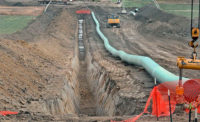The Army Corps of Engineers will grant an easement to build the final section of the Dakota Access Pipeline under Lake Oahe and will cancel plans to conduct an environmental impact statement in connection with the easement, according to a notice issued on Feb. 7.
The decision is in response to a Jan. 24 order from President Donald Trump that directed the Corps to review its Dec. 4 decision that required a full environmental impact statement on the last section of the oil pipeline under Lake Oahe in North Dakota.
In the memo, Douglas Lamont, acting assistant secretary for the Army, said the Corps already has completed an environmental assessment and a technical and legal review of the easement. All requirements of the National Environmental Policy Act were met through those reviews, he said.
“I have determined that there is no cause for completing any additional environmental analysis,” he wrote.
Earthjustice, which is representing the Standing Rock Sioux tribe, said that, as soon as the easement is issued, it would file to stop it in court. The indigenous people and environmental groups who have been fighting the pipeline said they actively would fight the decision.
“Donald Trump will not build his Dakota Access Pipeline without a fight. The granting of an easement, without any environmental review or tribal consultation, is not the end of this fight—it is the new beginning,” said Tom Goldtooth, executive director of the Indigenous Environmental Network. “Expect mass resistance far beyond what Trump has seen so far.”
The Standing Rock Sioux says the tribe will seek to shut down operations if the pipeline is completed. Further, it wants the court to force the pipeline operators to disclose oil-spill and risk-assessment records.
The Standing Rock Sioux and other opponents of the line say it could threaten their water source if the pipeline leaks.
Construction on the last section of the line is expected to take from 60 to 90 days to complete.
Meanwhile, out of concerns of flooding, the Corps has ordered closure of the protest camp near the pipeline route.
“We hope to see a speedy resolution of an approval process that was hijacked by extremists and whose challenges and protests were able to block a legally approved and permitted project,” said Terry O’Sullivan, general president of the Laborers’ International Union of North America.



